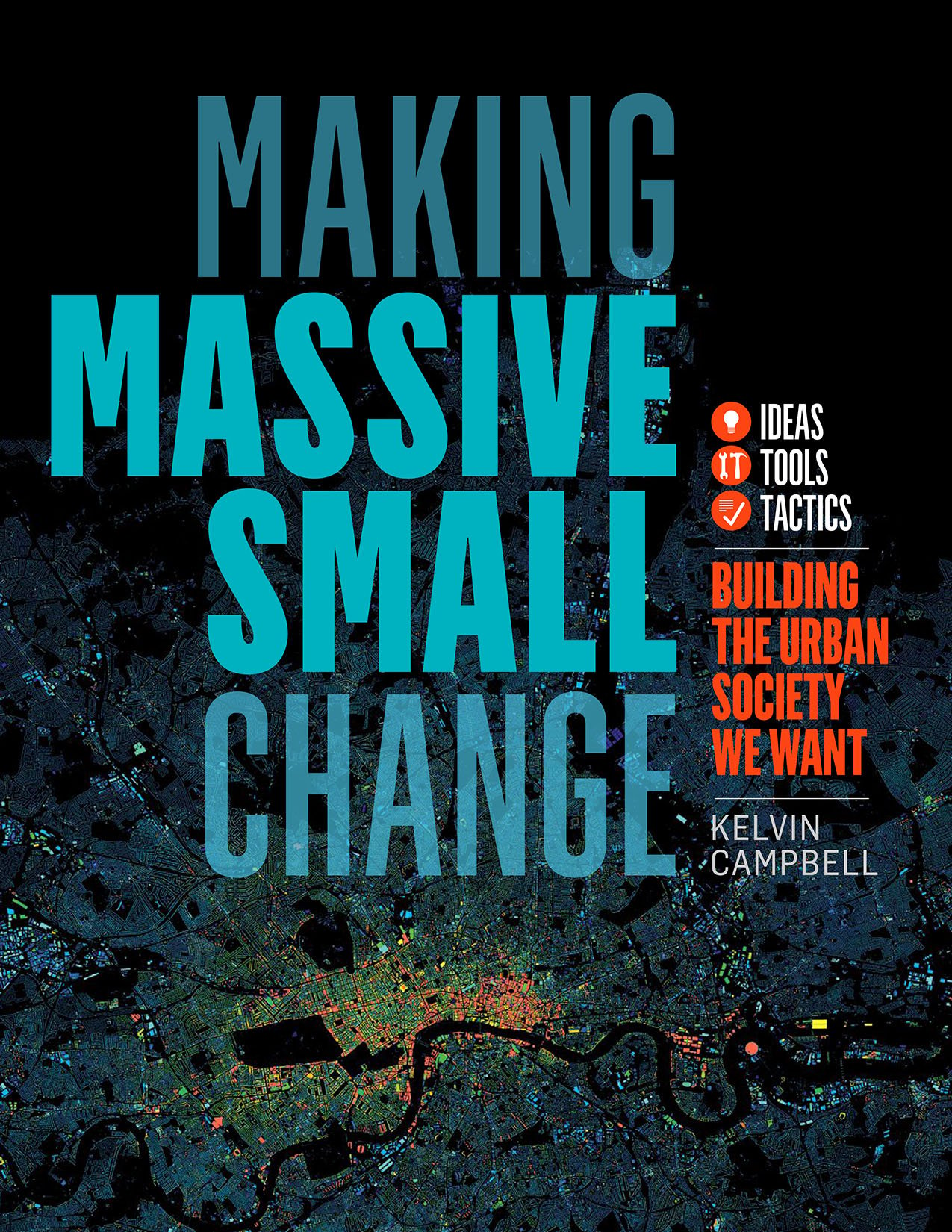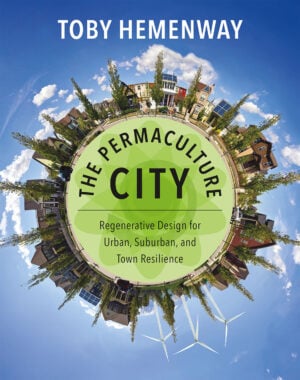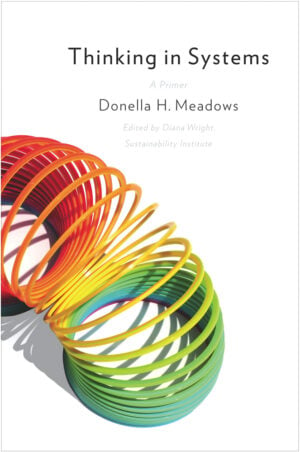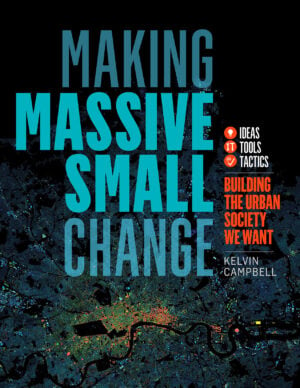Making Massive Small Change
Ideas, Tools, Tactics: Building the Urban Society We Want
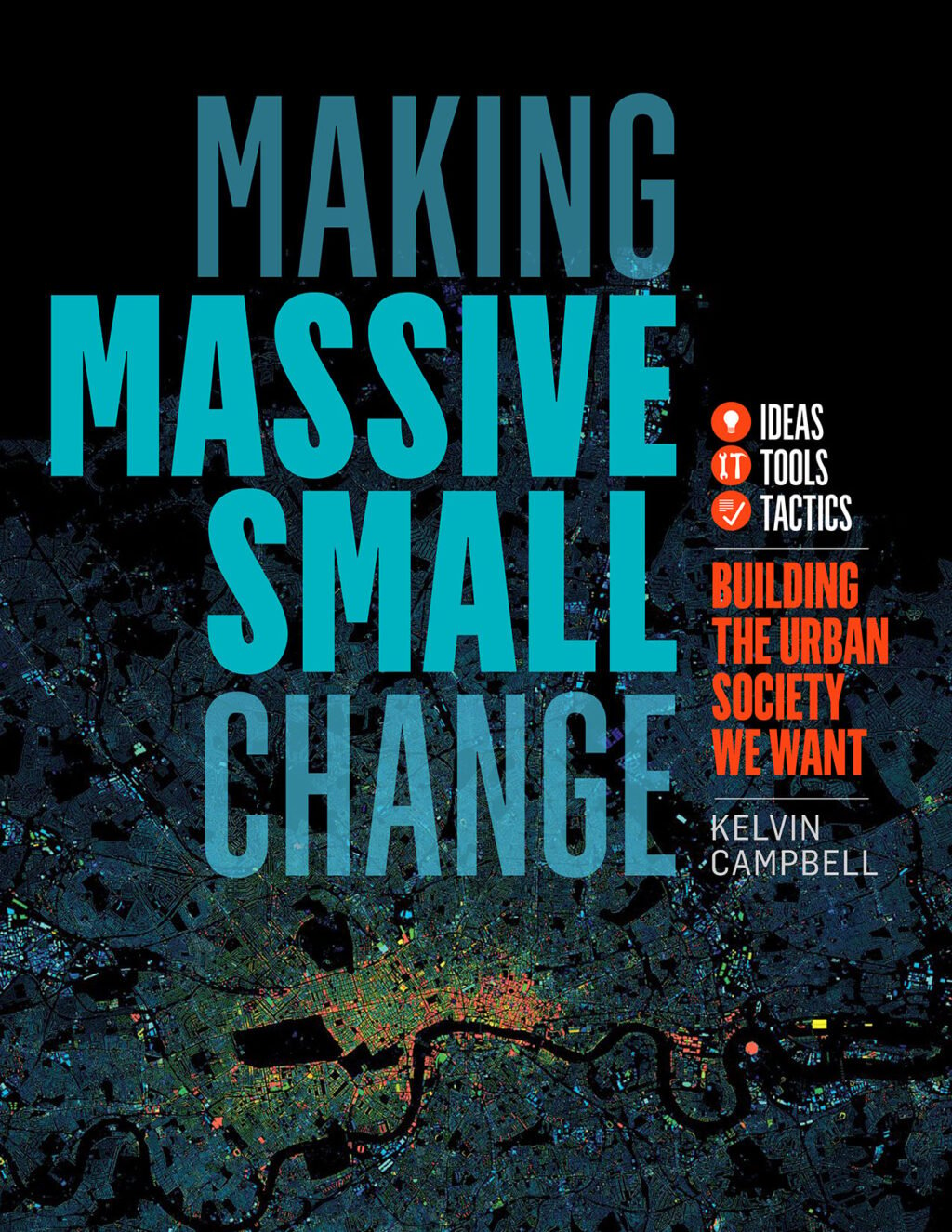
| Pages: | 384 pages |
| Book Art: | Full-color photographs and illustrations throughout |
| Size: | 8.5 x 11 inch |
| Publisher: | Chelsea Green Publishing |
| Pub. Date: | December 17, 2018 |
| ISBN: | 9781603587754 |
Making Massive Small Change
Ideas, Tools, Tactics: Building the Urban Society We Want
Bookbuilders of Boston Winner — Professional, Illustrated Category
The key to fixing our broken patterns of urban development does not lie in grand plans or giant projects; rather, it lies in the collective wisdom and energy of people harnessing the power of many small ideas and actions to make a big difference. We call this making “Massive Small” change.
In an increasingly complex and changing world where global problems are felt locally, the systems we use to plan, design, and build our urban neighborhoods are failing. For three generations, governments the world over have tried to order and control the evolution of cities through rigid, top-down action. Yet, master plans lie unfulfilled, housing is in crisis, the environment is under threat, and the urban poor have become poorer.
The system is not broken: it was built this way. And governments alone cannot solve these problems. But there is another way—the Massive Small way—a concept developed by Kelvin Campbell, the innovative founder of Urban Initiatives, an internationally recognized urban design practice based in London, and curator of Smart Urbanism [Massive Small], one of the largest LinkedIn communities in the field of online urbanism.
Making Massive Small Change, the first truly comprehensive sourcebook to come out of this work, showcases cities as they really are—deeply complex, adaptive systems. As such, it offers an alternative to our current highly mechanistic model of urban development. With roots in the work of great urban theorists such as Jane Jacobs, Christopher Alexander, and E. F. Schumacher, Making Massive Small Change integrates this thinking with Complexity Theory and a scientific understanding of sustainability and resilience in cities. It sets out the enabling protocols, conditions, and behaviors that deliver Massive Small change in our neighborhoods. It describes and illustrates the ideas, tools, and tactics being used to help engaged citizens, civic leaders, and urban professionals to work together to build viable urban society, and it will show how effective system change can be implemented.
Highly illustrated with stunning graphics and photographs of cityscapes and urban life, this essential toolkit for the future can be called the next Whole Earth Catalog for twenty-first century urban planning and development.
Reviews and Praise
‘An extremely valuable new handbook of urbanism—it’s the beauty of simplicity and small actions that can provoke a positive start. Wise urban acupuncture and co-responsibility for incremental change.’—Jaime Lerner, architect and urbanist; author of Urban Acupuncture
More Reviews and Praise
‘Bigness has grown out of control—in our cities and in our life-critical systems—but here’s the good news: small actions are the best way to cut bigness down to size, and this compendium contains a thousand different ways to start.’—John Thackara, founder of Doors of Perception; author of How to Thrive in the Next Economy
‘Kelvin Campbell has done it again. Starting with a broad understanding of how urban change happens and needs to happen—less through top-down command-and-control methods, more through massive small interventions—he guides us through a rich compendium of tools and strategies. His section on process tools (what he calls “activators”) is particularly helpful—covering asset-based community development, participatory budgeting, and other crucial modifications of the malfunctioning “operating system for growth”. The compendium is richly illustrated with case studies and simple takeaways, like his “Ten Things to Do” and “Ten Things Not to Do”. They are eminently sensible, raising the question, Why are they still done and not done? The answer might be that Campbell’s book has not yet come along to give such a clear picture! Campbell says the book is only a beginning, and we look forward to more of his insightful work in the future. Meanwhile, this delightful book deserves a spot on the bookshelf next to The Death and Life of Great American Cities, A Pattern Language, and other icons of fine-grained, process-based development.’—Michael Mehaffy, PhD, executive director of Sustasis Foundation; coauthor of Design for a Living Planet
‘What a beautiful bastard this book is: a hybridised glossary, dictionary, manual, playbook, catalogue, manifesto, polemic and so much more. It is a stunningly curated Kama Sutra for city-making—inventive and seductive. If you have any connection with urban transformation, in any capacity, scale or setting, spend quality time with this book and engage with its many provocations.’—Edgar Pieterse, director of the African Centre for Cities; author of New Urban Worlds
‘Making Massive Small Change is an extremely valuable new handbook for urbanism that brings together the most pertinent, current, tested ideas and strategies for a better future.’—Kristien Ring, founding director of the German Centre for Architecture; author of Self-Made City
‘Making Massive Small Change is a passionate, heartfelt plea for a new approach to urban development, but it is also much more. Campbell presents evidenced arguments and highly innovative solutions from leading-edge, organised complexity research concepts, from his own four decades of practice, and from tactics of change-makers across the world. The Massive Small project is the culmination of a decade-long search for better, alternative ways to meet our city challenges from dialogues reaching out to practitioners, academics, and community activists across a wide network. Campbell’s call is for a renewed social movement—using an innovative framework of ideas, tools and tactics—to leverage the small-scale ideas and efforts of citizens, professionals and progressive governments into a collaborative urbanism that could have a massive positive impact on our current broken systems of urban development. These are important ideas—and an urgent call to action. Jane Jacobs would be overjoyed to see a designer finally turning her recommendations about organised complexity—made over fifty years ago—into a practical framework and toolbox for transformative action. It is a timely and major achievement.’—NezHapi Dellé Odeleye, PhD, course leader, department of Engineering and the Built Environment, Anglia Ruskin University
‘Finally a book that offers abundant evidence that a built environment is an organism composed of living cells. Kelvin Campbell demonstrates that professionals can learn from such evidence and find ways to contribute to the organism’s health.’—John Habraken, author of Supports and The Structure of the Ordinary
‘Making Massive Small Change is everything its author declares. That means it is an up-to-date sourcebook and vocabulary as well. My reading and re-reading list has been substantially updated. Kelvin’s comprehensive compendium is an ideal reference for all seeking patterns of sustainable and therefore bottom-up placemaking and management. The emerging paradigm, so clearly illustrated in this book, highlights the fact that only peoples’ local capacities can provide the vital variety of requirements for human and natural life.’—John F.C. Turner, architect; author of Freedom to Build and Housing By People
‘The urban neighbourhoods we know and love have evolved over generations with successive contributions from countless people. They have shaped buildings, streets and spaces as well as activities and processes. Today the way we build places is simpler, quicker and courser with fewer people involved. The principles and approaches in Making Massive Small Change reflect how we can empower people to once again participate in shaping our communities whilst creating more successful places.’—Ben Derbyshire, president of the Royal Institute of British Architects
‘This powerful and highly engaging book is an inspiring call for all of us to start making a difference tomorrow. I have always believed that more than hope driving action, it is action that drives hope. Read this book, be inspired by its stories of change from modest beginnings, and get working for a better world.’—Matthew Taylor, chief executive of the Royal Society for the Encouragement of Arts, Manufactures and Commerce
‘One quote from E. F. Schumacher that immediately comes to mind when reading Making Massive Small Change is: “Any intelligent fool can make things bigger and more complex . . . it takes a touch of genius—and a lot of courage—to move in the opposite direction”. This book does have more than a touch of genius and is massively courageous. This is an essential book for anyone involved in systems thinking, complexity and design. Aimed primarily at urban development it also applies to all aspects of human endeavours—all our institutions, governance, economics and trade emerge from the world we build around us and we need this message of small beginnings for massive system change.’—Ian Roderick, director of the Schumacher Institute
‘Making Massive Small Change is part of a growing movement that recognises the value of small, incremental development for our cities, our economies and our citizens. The systems that shape our communities have been distorted to privilege bigness—big companies, big projects, big budgets and big plans—while small actors face disproportionate burdens or outright exclusion from building their homes, businesses and communities. Just as urbanists reclaimed the lost knowledge of traditional design, we must now rediscover the value of incrementalism, of many small projects done by many hands, of enabling local residents and businesses to participate in community development. As a leading urban theorist, Kelvin Campbell recognized this early on, and with Making Massive Small Change has created this thorough compendium to address it. The thinking builds on good design to consider how the systems should be restructured—from closed to open, from centralized to local, from top-down to bottom-up—to enable small. And it provides new and collected tactics and tools to make it happen. Making Massive Small Change is a valuable contribution to the movement.’—Brian Falk, director of the Project for Lean Urbanism
‘Transforming cities is highly complex, and the challenge can often feel overwhelming. Large, sexy, iconic projects can be big targets and quite polarizing, which means they often don’t get delivered, creating layers of mistrust and frustration. Making Massive Small Change by urban maestro Kelvin Campbell shows us another way: that change doesn’t have to take decades to realise or even to be gold-plated. It shows us that small done well can actually be the most powerful change agent on the planet because it can mobilise a whole city or community, allowing the goodness to creep up. With cities, small can be mighty. Read this and make that change.’—Ludo Campbell-Reid, urbanist; Design Champion for Auckland, New Zealand
Reviews and Praise
‘An extremely valuable new handbook of urbanism—it’s the beauty of simplicity and small actions that can provoke a positive start. Wise urban acupuncture and co-responsibility for incremental change.’—Jaime Lerner, architect and urbanist; author of Urban Acupuncture
‘Bigness has grown out of control—in our cities and in our life-critical systems—but here’s the good news: small actions are the best way to cut bigness down to size, and this compendium contains a thousand different ways to start.’—John Thackara, founder of Doors of Perception; author of How to Thrive in the Next Economy
‘Kelvin Campbell has done it again. Starting with a broad understanding of how urban change happens and needs to happen—less through top-down command-and-control methods, more through massive small interventions—he guides us through a rich compendium of tools and strategies. His section on process tools (what he calls “activators”) is particularly helpful—covering asset-based community development, participatory budgeting, and other crucial modifications of the malfunctioning “operating system for growth”. The compendium is richly illustrated with case studies and simple takeaways, like his “Ten Things to Do” and “Ten Things Not to Do”. They are eminently sensible, raising the question, Why are they still done and not done? The answer might be that Campbell’s book has not yet come along to give such a clear picture! Campbell says the book is only a beginning, and we look forward to more of his insightful work in the future. Meanwhile, this delightful book deserves a spot on the bookshelf next to The Death and Life of Great American Cities, A Pattern Language, and other icons of fine-grained, process-based development.’—Michael Mehaffy, PhD, executive director of Sustasis Foundation; coauthor of Design for a Living Planet
‘What a beautiful bastard this book is: a hybridised glossary, dictionary, manual, playbook, catalogue, manifesto, polemic and so much more. It is a stunningly curated Kama Sutra for city-making—inventive and seductive. If you have any connection with urban transformation, in any capacity, scale or setting, spend quality time with this book and engage with its many provocations.’—Edgar Pieterse, director of the African Centre for Cities; author of New Urban Worlds
‘Making Massive Small Change is an extremely valuable new handbook for urbanism that brings together the most pertinent, current, tested ideas and strategies for a better future.’—Kristien Ring, founding director of the German Centre for Architecture; author of Self-Made City
‘Making Massive Small Change is a passionate, heartfelt plea for a new approach to urban development, but it is also much more. Campbell presents evidenced arguments and highly innovative solutions from leading-edge, organised complexity research concepts, from his own four decades of practice, and from tactics of change-makers across the world. The Massive Small project is the culmination of a decade-long search for better, alternative ways to meet our city challenges from dialogues reaching out to practitioners, academics, and community activists across a wide network. Campbell’s call is for a renewed social movement—using an innovative framework of ideas, tools and tactics—to leverage the small-scale ideas and efforts of citizens, professionals and progressive governments into a collaborative urbanism that could have a massive positive impact on our current broken systems of urban development. These are important ideas—and an urgent call to action. Jane Jacobs would be overjoyed to see a designer finally turning her recommendations about organised complexity—made over fifty years ago—into a practical framework and toolbox for transformative action. It is a timely and major achievement.’—NezHapi Dellé Odeleye, PhD, course leader, department of Engineering and the Built Environment, Anglia Ruskin University
‘Finally a book that offers abundant evidence that a built environment is an organism composed of living cells. Kelvin Campbell demonstrates that professionals can learn from such evidence and find ways to contribute to the organism’s health.’—John Habraken, author of Supports and The Structure of the Ordinary
‘Making Massive Small Change is everything its author declares. That means it is an up-to-date sourcebook and vocabulary as well. My reading and re-reading list has been substantially updated. Kelvin’s comprehensive compendium is an ideal reference for all seeking patterns of sustainable and therefore bottom-up placemaking and management. The emerging paradigm, so clearly illustrated in this book, highlights the fact that only peoples’ local capacities can provide the vital variety of requirements for human and natural life.’—John F.C. Turner, architect; author of Freedom to Build and Housing By People
‘The urban neighbourhoods we know and love have evolved over generations with successive contributions from countless people. They have shaped buildings, streets and spaces as well as activities and processes. Today the way we build places is simpler, quicker and courser with fewer people involved. The principles and approaches in Making Massive Small Change reflect how we can empower people to once again participate in shaping our communities whilst creating more successful places.’—Ben Derbyshire, president of the Royal Institute of British Architects
‘This powerful and highly engaging book is an inspiring call for all of us to start making a difference tomorrow. I have always believed that more than hope driving action, it is action that drives hope. Read this book, be inspired by its stories of change from modest beginnings, and get working for a better world.’—Matthew Taylor, chief executive of the Royal Society for the Encouragement of Arts, Manufactures and Commerce
‘One quote from E. F. Schumacher that immediately comes to mind when reading Making Massive Small Change is: “Any intelligent fool can make things bigger and more complex . . . it takes a touch of genius—and a lot of courage—to move in the opposite direction”. This book does have more than a touch of genius and is massively courageous. This is an essential book for anyone involved in systems thinking, complexity and design. Aimed primarily at urban development it also applies to all aspects of human endeavours—all our institutions, governance, economics and trade emerge from the world we build around us and we need this message of small beginnings for massive system change.’—Ian Roderick, director of the Schumacher Institute
‘Making Massive Small Change is part of a growing movement that recognises the value of small, incremental development for our cities, our economies and our citizens. The systems that shape our communities have been distorted to privilege bigness—big companies, big projects, big budgets and big plans—while small actors face disproportionate burdens or outright exclusion from building their homes, businesses and communities. Just as urbanists reclaimed the lost knowledge of traditional design, we must now rediscover the value of incrementalism, of many small projects done by many hands, of enabling local residents and businesses to participate in community development. As a leading urban theorist, Kelvin Campbell recognized this early on, and with Making Massive Small Change has created this thorough compendium to address it. The thinking builds on good design to consider how the systems should be restructured—from closed to open, from centralized to local, from top-down to bottom-up—to enable small. And it provides new and collected tactics and tools to make it happen. Making Massive Small Change is a valuable contribution to the movement.’—Brian Falk, director of the Project for Lean Urbanism
‘Transforming cities is highly complex, and the challenge can often feel overwhelming. Large, sexy, iconic projects can be big targets and quite polarizing, which means they often don’t get delivered, creating layers of mistrust and frustration. Making Massive Small Change by urban maestro Kelvin Campbell shows us another way: that change doesn’t have to take decades to realise or even to be gold-plated. It shows us that small done well can actually be the most powerful change agent on the planet because it can mobilise a whole city or community, allowing the goodness to creep up. With cities, small can be mighty. Read this and make that change.’—Ludo Campbell-Reid, urbanist; Design Champion for Auckland, New Zealand

